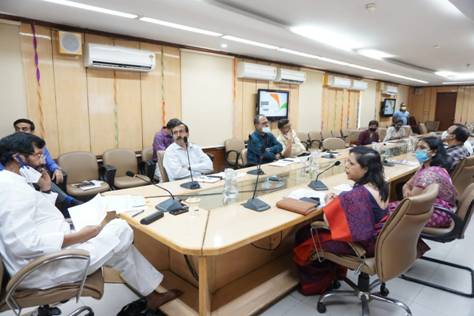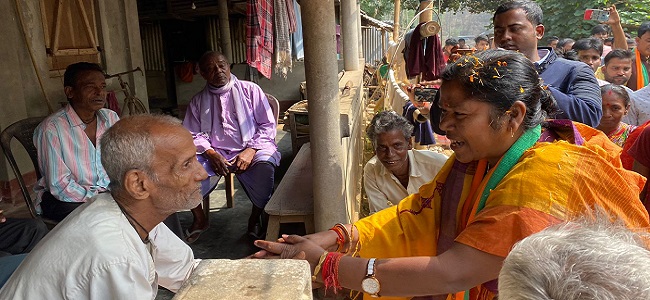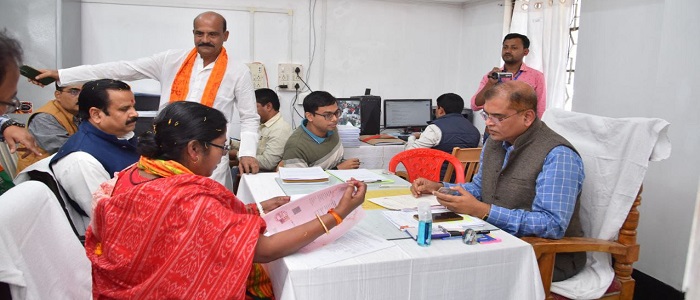New Delhi: The Government is making efforts to ensure that foodgrains are readily available for distribution in all the States for meeting their requirements under the “Pradhan Mantri Garib Kalyan Anna Yojana (PM-GKAY)”. The Union Minister for Consumer Affairs, Food and Public Distribution, Shri Ram Vilas Paswan said the FCI has already loaded a total number of 2641 rakes (including Wheat and Rice) towards this end and the approx quantity loaded is 73.95 LMT (55.38 LMT Rice and 18.57 LMT Wheat). This is an all time record as this heavy / huge movement of foodgrains was accomplished during the period from 24.03.2020 (the date on which lockdown was clamped across the country) to 08.05.2020.
He said 21 States/UT have completed more than 90% distribution for the month of April under PM-GKAY covering nearly 41.35 Crore beneficiaries in these States/UTs. Some States/UTs namely, Andaman Nicobar Island, D&NH and Daman & Diu, Madhya Pradesh, Odisha, Puducherry, Himachal Pradesh etc. are distributing foodgrains for two months in one go under PMGKAY.
The Minister said 6 Crore Special SMSs have also been sent by about 20 States/UTs to NFSA ration card holders for awareness generation about of additional benefit of free foodgrains under PM-GKAY.
PM-GKAY is aimed at ameliorating the hardships faced by the poor due to various economic disruptions caused by the COVID19 pandemic. Under the package the Government aims to ensure no poor vulnerable family/person suffers on account of non-availability of foodgrains due to disruptions in the next three months.
Accordingly, the Department of Food & Public Distribution has also announced the policy decision taken in this regard to distribute additional foodgrains to about 80 Crore NFSA beneficiaries under the PM-GKAY in all States/UTs for a period of three months April to June 2020, including the UTs which are on DBT Cash Transfer mode.
Pulses distribution under PM-GKAY
Besides the food grains, Shri Paswan said the Government is also distributing free one kg of pulses to about 19.50 crore households for three months in the country. He said, this is the first time that the Department of Consumer Affairs is carrying such a massive operation of pulses. Government has allowed use of its stocks lying in about 165 NAFED godowns across the country for this scheme. Over 100 dal mills across the country have been pressed into service by NAFED so far.
The Minister said, as on date, about 51,105 LMT of pluses have been distributed across 21 States and 5 UTs. He said the delay in supply and distribution of pulses is due to late intimation by States/UTs on their choice of particular pulses variety such as Tur Dal, Urad Whole, Moong Whole, Chana hole, Chana Dal and Masur Dal besides the logistics involved in transportation from different States during the lockdown. In many inaccessible locations, such as Vijayanagar in Arunachal Pradesh on the Myanmar border and Ladakh, pulses have been lifted by air route under extremely challenging conditions. Besides, some States like UP have decided to distribute pulses with food grains in order to minimize social contact leading to delayed distribution, he said.
17 States/UTs covered under ‘One Nation One Ration Card’
Shri Paswan said, under the “One Nation One Ration Card” plan, 5 more States/UT of Uttar Pradesh, Bihar, Punjab, Himachal Pradesh and Darda & Nagar Haveli and Daman & Diu, have been asked to integrate with the National Cluster. The cluster already has 12 States namely – Andhra Pradesh, Goa, Gujarat, Haryana, Jharkhand, Kerala, Karnataka Madhya Pradesh, Maharashtra, Rajasthan, Telangana and Tripura w.e.f. 1st January 2020. Now, with a total of 17 States/UTs integrated with the National Cluster, the facility of national/inter-State portability would be enabled for 60 Crore NFSA beneficiaries of 17 States/UTs to lift their entitled quota of foodgrains from any Fair Price Shop of their choice by using their same/existing ration card.
Food grains procurement by FCI on track
Shri Paswan assured sufficient food grains supply is available to meet the increased demands and the procurement process is also on track. As on 08.05.2020, cumulative Procurement of Wheat in Rabi Marketing Season (RMS) 2020-21 is 226.85 LMT whereas corresponding procurement during RMS 2019-20 was 277.83 LMT. Therefore, procurement of Wheat in current season is less by 18.35% than the previous season in corresponding period, he said. Cumulative Procurement of Paddy, as on 06.05.2020, in terms of Rice in Kharif Marketing Season (KMS) 2019-20 is 439.02 LMT whereas corresponding procurement during KMS 2018-19 was 398.13 LMT. Therefore, procurement of rice in current season is more by 10.27%, he said.
The procurement of Wheat and Paddy / Rice during RMS 2020-21 normally commences on the 1st of April. But due to COVID-19 situation, most of States could commence their procurement operations around 15th of April.
In view of the prevailing unprecedented situation, it has been decided that procurement of Wheat during the ensuing Rabi Marketing Season (RMS) 2020-21 and Procurement of Paddy / Rice of Rabi Crop in Kharif Marketing Season (KMS) 2019-20 may be carried out on provisional basis, while keeping the target / estimate of procurement the same as during previous RMS -2019-20 and KMS 2018-19 (Rabi crop) in case of wheat and Paddy / Rice, respectively.
States were advised to ensure that the procurement operations take place in a staggered manner so as to avoid congregation of large number of farmers at a time and some kind of token system should be put in place for this. The number of procurement centres could also be increased to the extent possible so as to disperse the procurement operations for ensuring social distancing and maintaining hygiene at these centres.
Shri Paswan said the Department of Food & Public Distribution has constituted a Task Force to assess the situation arising out of shortage of jute bags / bales for packaging of foodgrains due to the COVID19 lockdown and also relaxed guidelines for packaging of foodgrains in used gunny bags and HDPE /PPE bags (commonly known as plastic bags for packaging of foodgrains, especially Wheat).






